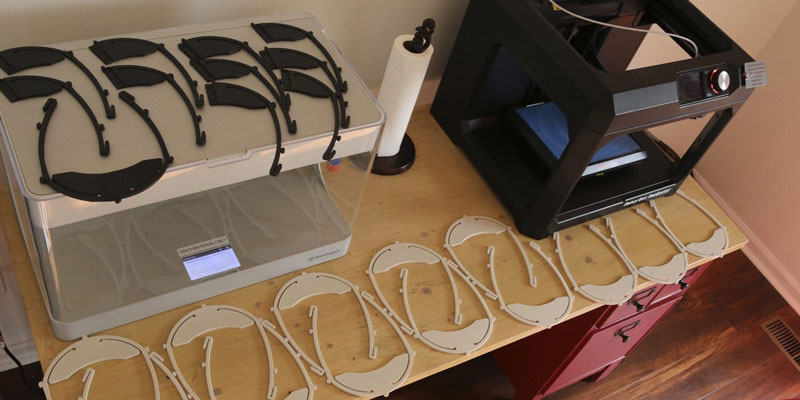Doctors and nurses caring for COVID-19 patients at Birmingham’s UAB Hospital will soon receive protective face shields thanks to 3-D printing technology and a partnership involving the Alabama Productivity Center at the University of Alabama, Alabama Power and UAB’s School of Engineering.
Alan Hill, executive director of the Culverhouse College of Business’s Alabama Productivity Center (APC), said the effort is moving ahead quickly despite getting started only last Friday.
Already, the Alabama Productivity Center’s two 3-D printers, running non-stop over the weekend, have turned out over 30 plastic headbands for the face shields. At the UAB School of Engineering, Justin Koch is producing headbands on five 3-D printers, and Scott Bishop of Alabama Power’s Technology Applications Center is printing headbands on two printers and laser cutting the plastic shields for some of the headbands produced. Final assembly is expected to take place at UAB.
“This is a really tremendous team effort,” Hill said. “My wife is a nurse at UAB Hospital, and as this is building, we’ve all seen the struggles that healthcare workers are going through right now.
“They’re the true heroes in this.”
Bishop, the team leader at Alabama Power’s Technology Applications Center, said the group hopes to soon be able to turn out 50 to 100 completed face shields per day.
“We’re not making thousands of face shields a day, but we’re trying to do our part. That can be said of what we’re doing and what others are doing. If we all do our part, we can help meet that need,” Bishop said.
Greg Canfield, Secretary of the Alabama Department of Commerce, said the effort represents a great example of the state’s education community joining forces with the private sector to combat COVID-19.
“Right now, the effort is really focused on the needs of UAB Hospital, but if the team can broaden the production network to other universities and partners in Alabama, they should be able to provide more of a statewide focus,” Secretary Canfield said.
UNIVERSITY EFFORTS
Meanwhile, employees at the University of Montevallo have embarked on a similar mission to produce face shields for Shelby Baptist Medical Center in Alabaster.
The Montevallo effort was sparked by Michael Price of the university’s Carmichael Library, who read news reports about people making personal protective equipment to donate to hospitals. He turned to a colleague at the university, Kyle Moore, who also had access to a 3-D printer.
The group’s goal is to print and deliver 50 ready-to-use protective face masks to the Alabaster hospital to help protect medical professionals as they treat patients affected by COVID-19.
“We both have had printers running for the past week,” Price said last Friday. “Printing two masks and two filter holders takes about six-and-a-half hours.”
Another group at UA is also doing its part. The University’s MBA Network and the Culverhouse College of Business STEM MBA Program have partnered with the College of Engineering and a local network of makers to create face shields.
The group has produced 120 shields and distributed them through the University of Alabama CCHS network, which will provide them to the DCH Regional Medical Center in Tuscaloosa and local health care providers.
The group has enough material to produce about 1,000 additional shields and aims to keep production going as long as needed. In the future, it hopes to produce masks, gowns and gloves.
SCALING PRODUCTION
To help meet expected surging demand for the face shields, Hill at the Alabama Productivity Center said his group is looking to scale up the production effort and recruit new partners across the state.
Another 3-D printer based at the UA College of Engineering is being added to the Alabama Productivity Center’s impromptu assembly line, thanks to Professor Paul Allison. Conversations are taking place with private businesses and others across Alabama that could pitch in critical resources and expertise.
The Alabama Productivity Center is affiliated with the Alabama Community College System’s Alabama Technology Network, so other ATN centers in the state could also be valuable partners, Hill said.
The project got started last Friday after Bishop reached out to UAB’s Koch and the Alabama Productivity Center’s Jody Beck with the idea of producing the face shields.
Beck recruited his wife, Sadie, a Ph.D. student in mechanical engineering at UA, to help out. Since the university is closed, Beck had already moved the Alabama Productivity Center’s two desktop 3-D printers to the family residence, now turned workshop.
“These circumstances created a perfect fit to help support an important project with the largest medical facility in our state to combat this terrible virus,” Hill said. “Jody and Sadie have run these printers around the clock this weekend and had produced 19 face shield headbands by Monday morning.”
Because it takes around three hours for one of the Alabama Productivity Center’s printers to produce a single headband, it’s clear that partners with 3-D printing capabilities could be a massive help in turning out the much-needed face shields, Hill said.
“This is a no-fee project for us, but it is probably one of the most impactful we will do this year,” he said.
(Courtesy of Made in Alabama)
Don’t miss out! Subscribe today to have Alabama’s leading headlines delivered to your inbox.
